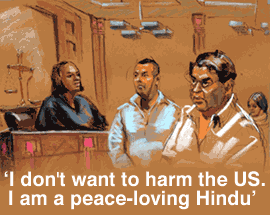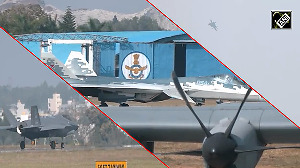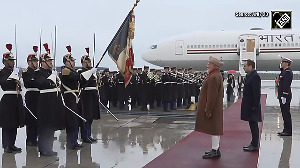
Part I: 'It was just temptation. Bad company corrupts good morals'
The first three months were very difficult, I spent most of my time in the cell crying," he recalls. "Even when Saddam (Hussain) was arrested, they said, 'Your brother has been caught'," he recalls.
"But now they are very nice, they have realized that I don't want to harm this country (the US), that I am a peace-loving Hindu."
Another problem during the initial days of his incarceration was food. "In the beginning, I had a lot of problems since I am a strict vegetarian, and I kept telling them I can't eat meat."
"Of late, though, I get vegetarian fare and the guards treat me well."
"My cell has become my little temple," he says.
Lakhani's day begins at 5 am, which is when breakfast is served to the inmates.
"I just take my tray and go back to sleep until about 7 am. Then I wake up and do some yoga for about 40 minutes to keep fit, and then I eat my breakfast -- usually cereal, cornflakes, milk, bread and sometimes an apple pie from personal stocks we are allowed to keep."
He then spends an hour in prayer; it has, he says, been a source of great personal strength. "My wife Kusum and I are devout Hindus, and I still pray for about two hours or more every day, morning and evening."
11 am is lunchtime. And then, Lakhani gets down to work.
"I go through every tape, every video, I translate them and make notes," he says.
The authorities have provided him with a tape recorder, and a television.
The former helps him keep track of the evidence, and the inconsistencies he spots; the latter helps pass the time, and keeps him abreast of the world he is no longer part of. He also reads the The Washington Journal and the Daily News.
His former life in London invites reminiscences. He was there, he says, before the Hindujas and the Mittals became what they are.
"My grandfather was the attorney general of Porbandar, and all my cousins were lawyers, and I also had a law degree -- but I wanted to be better so I went to London where I studied law for two years."
He segued into the garment business and, in about 10 years, he says, he became the best in the business.
He then dabbled in everything he could get his hands on -- rice and oil, among others, building up business interests that took him all over the world, from Paris to Dusseldorf to Russia to the Middle East.
In between high-profile socialising, Lakhani kept growing, and branching out into various businesses. For instance he bought up India's rupee debt to the former USSR, "where I made a lot of money." And later, an old friend of his who was in the business of military supplies to the Indian government sought his help to procure supplies from the Ukraine.
"The Indian government had a policy of not engaging middlemen, so I made my money on the other side and eventually got into the industrial-military complex with Ukerexport, a Ukranian company," he recalls. "During that time, I supplied some armoured carriers to Angola and I used to pass through Dubai very often."
That is where he met Abdul Qayoom, a member of the Mumbai underworld wanted by the Indian government for his alleged involvement in the 1993 Mumbai blasts.
"We knew him as Raj. He told me he knew someone in the US who wanted to do some business in military equipment since he knew I had done something in Angola and that I had contacts in the former USSR," Lakhani said.
"He put me in touch with Haji, who I met in Dubai in 2002 and who said the Saudis were taking their money out of the US after 9/11 and there was lots of money to be made."
That was how he started off in arms deals, and set foot on the road that led to his doom. "My son Sanjay asks me why I got into this," he says, breaking down again. "I regret it now, I regret agreeing to do this."
Expressions of regret notwithstanding, Lakhani protests he is blame-free.
"There was no missile, even the one that was held (during his arrest) is a dud, there was no buyer, no seller, it was all a trap and the man who trapped me is wanted in his home country and here," he alleges. "He has defrauded people here, even his own countrymen."
"But I'm innocent, there was no premeditation on my part for all this," Lakhani says. "He told me he had $35 million, he told me it was for a Somali group, he didn't tell me it had anything to do with the US."
"I was tempted, it was just temptation, must have been in my naseeb (fate). Bad company corrupts good morals."
Before his arrest, Lakhani was a regular visitor to New York where his son runs a garment business.
His son, he says, is worried about him. "We are more like friends and he is very straightforward," Lakhani says. "He says, 'Why did you have to get into this business when you were doing well, you should never have thought about it'."
Lakhani, a British citizen, lived on Wykeham Road, in Hendon, north London. "I was one of the first Indians to have a Rolls Royce, I was part of the first wave before the others came in after the Ugandan purges by Idi Amin.
"I have a £750,000 house there, we were respected members of the community and then one fine morning, my name was all over the newspapers across the world."
The realization of his fall cues fresh sobs. Everyone has deserted him, he says through his tears.
"All those friends are gone, they have left me. My wife is keeping fasts for me, my aunts, my bhabhis, they have all given up something or the other, taken vows not to eat this or that until I am free, and here I am."
Faith is all he has left, he says. "I have my shraddha, my belief in God, these are the testing times of my life. I never had to suffer in my life but now, I am learning the meaning of suffering."
He hopes, too, that Indian Americans will hear his story out before judging him.
"I am a desi, I will remain a desi, and I just want the people of my community to believe that I am not guilty."
Illustration: Getty Images
Image: Uday Kuckian






 © 2025
© 2025